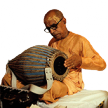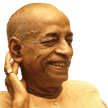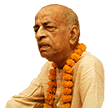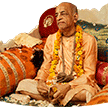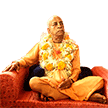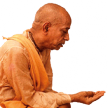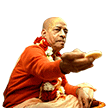Yoga Practice - an essential subject: Difference between revisions
(Created page with "Category:Essential Subjects <!----------------------- edit below this line -----------------------> <!------------------------ begin introduction text below --------------...") |
(Vanibot #0041: Moves Choose Another box to the end) |
||
| Line 2: | Line 2: | ||
<!----------------------- edit below this line -----------------------> | <!----------------------- edit below this line -----------------------> | ||
<!------------------------ begin introduction text below ------------------------> | <!------------------------ begin introduction text below ------------------------> | ||
The purpose of practicing eightfold yoga is to control the mind in order to make it a friend in discharging the human mission. Unless the mind is controlled, the practice of yoga (for show) is simply a waste of time. One who cannot control his mind lives always with the greatest enemy, and thus his life and its mission are spoiled. The constitutional position of the living entity is to carry out the order of the superior. As long as one's mind remains an unconquered enemy, one has to serve the dictations of lust, anger, avarice, illusion, etc. But when the mind is conquered, one voluntarily agrees to abide by the dictation of the Personality of Godhead, who is situated within the heart of everyone as Paramātmā. Real yoga practice entails meeting the Paramātmā within the heart and then following His dictation. For one who takes to Kṛṣṇa consciousness directly, perfect surrender to the dictation of the Lord follows automatically. | |||
Srila Prabhupada's books, lectures, conversations and letters offer a comprehensive presentation of this essential subject as seen in the Vaniquotes '''[[Vaniquotes:Category: | Srila Prabhupada's books, lectures, conversations and letters offer a comprehensive presentation of this essential subject as seen in the Vaniquotes '''[[Vaniquotes:Category:Yoga Practice|Yoga Practice]]''' category. An introduction from his books is given below in the following 8 quotes. | ||
<!-------- end introduction text and don't touch next three lines ---------> | <!-------- end introduction text and don't touch next three lines ---------> | ||
== Quotes from Srila Prabhupada's books == | == Quotes from Srila Prabhupada's books == | ||
<!----------------- edit quote boxes below this line -----------------> | <!----------------- edit quote boxes below this line -----------------> | ||
{{VaniQuotebox| | {{VaniQuotebox|A devotee does not need to endeavor to transfer himself by yoga practice to other planets. Rather, the Supreme Lord, by His great mercy, comes at once, riding on His bird carrier Garuda, and at once delivers the devotee from material existence|A child is completely cared for by his parents, and thus his position is secure. Similarly, a devotee does not need to endeavor to transfer himself by yoga practice to other planets. Rather, the Supreme Lord, by His great mercy, comes at once, riding on His bird carrier Garuḍa, and at once delivers the devotee from material existence. Although a man who has fallen in the ocean may struggle very hard and may be very expert in swimming, he cannot save himself. '''(Bhagavad-gītā 12.6-7)'''}} | ||
{{VaniQuotebox| | {{VaniQuotebox|A drunkard or smoker or sex-monger can never be eligible to practice yoga|The word vidyotamānam indicates that the brahmacārī feature showed in his body. That is the certificate that one has undergone great austerity in yoga. A drunkard or smoker or sex-monger can never be eligible to practice yoga. Generally yogīs look very skinny because of their not being comfortably situated, but Kardama Muni was not emaciated, for he had seen the Supreme Personality of Godhead face to face. '''(Śrīmad-Bhāgavatam 3.21.45-47)'''}} | ||
{{VaniQuotebox| | {{VaniQuotebox|A yogi can place his mind and intelligence within the air circulating inside his body, and by practicing the art of breath control he can mix that air with the air that blows all over the universe outside his body|Only under superior guidance can one practice such yoga in his life without changing his social position. As already described, a yogī can go anywhere he desires without mechanical help, for a yogī can place his mind and intelligence within the air circulating inside his body, and by practicing the art of breath control he can mix that air with the air that blows all over the universe outside his body. With the help of this universal air, a yogī can travel to any planet and get a body suitable for its atmosphere. '''(Caitanya-caritāmṛta, Ādi-līlā 5.22)'''}} | ||
{{VaniQuotebox| | {{VaniQuotebox|Although Maharaja Prthu stopped all practice of mystic yoga after realizing Krsna consciousness, he took advantage of his previous practice and immediately placed himself on the brahma-bhuta platform in order to accelerate his return to Godhead|It appears that Mahārāja Pṛthu had no desire to promote himself to the higher planetary systems. He wanted to return home immediately, back to Godhead. Although Mahārāja Pṛthu stopped all practice of mystic yoga after realizing Kṛṣṇa consciousness, he took advantage of his previous practice and immediately placed himself on the brahma-bhūta platform in order to accelerate his return to Godhead. '''(Śrīmad-Bhāgavatam 4.23.14)'''}} | ||
{{VaniQuotebox| | {{VaniQuotebox|Although the inhabitants of Kimpurusa-loka are naturally endowed with such powers (mystic powers), one can attain these powers on this planet by performing different yogic practices|Bakāsura appeared before Kṛṣṇa and His cowherd boyfriends as a gigantic crane. While present on this planet, Lord Kṛṣṇa had to fight with many demons who could exhibit the wonderful mystic powers of Kimpuruṣa-loka. Although the inhabitants of Kimpuruṣa-loka are naturally endowed with such powers, one can attain these powers on this planet by performing different yogic practices. '''(Śrīmad-Bhāgavatam 4.18.20)'''}} | ||
{{VaniQuotebox| | {{VaniQuotebox|Although Visvamitra Muni was engaged in practicing mystic yoga with closed eyes, his transcendental meditation was broken when he heard the tinkling of bangles on the hands of Menaka|It is sometimes understood that a person becomes lusty just by hearing the tinkling of bangles on the hands of women or the tinkling of ankle bells, or just by seeing a woman's sari. Thus it is concluded that woman is the complete representation of māyā. Although Viśvāmitra Muni was engaged in practicing mystic yoga with closed eyes, his transcendental meditation was broken when he heard the tinkling of bangles on the hands of Menakā. '''(Śrīmad-Bhāgavatam 4.24.12)'''}} | ||
{{VaniQuotebox| | {{VaniQuotebox|Another example (to show that the practice of mystic yoga is not sufficiently strong to control the senses) is Prince Agnidhra, whose attention was drawn to the movements of Purvacitti, the Apsara, simply because he heard the tinkling of her ankle bells|The practice of mystic yoga, therefore, is not sufficiently strong to control the senses. Another example is Prince Āgnīdhra, whose attention was drawn to the movements of Pūrvacitti, the Apsarā, simply because he heard the tinkling of her ankle bells. In the same way that Viśvāmitra Muni was attracted by the tinkling bangles of Menakā, Prince Āgnīdhra, upon hearing the tinkling bangles of Pūrvacitti, immediately opened his eyes to see her beautiful movements as she walked. '''(Śrīmad-Bhāgavatam 5.2.5)'''}} | ||
{{VaniQuotebox| | {{VaniQuotebox|Anyone who practices yoga and comes to the point of devotional service can attain the Supreme Personality of Godhead in His transcendental abode|When, by meditation on the Supreme Personality of Godhead in all detail, one comes to the point of love of God, that is the point of bhakti-yoga, and at that point he must actually render service to the Lord out of transcendental love. Anyone who practices yoga and comes to the point of devotional service can attain the Supreme Personality of Godhead in His transcendental abode. '''(Śrīmad-Bhāgavatam 3.29.35)'''}} | ||
<!----------------- edit quote boxes above this line -----------------> | <!----------------- edit quote boxes above this line -----------------> | ||
''' | '''Yoga Practice - [[Vaniquotes:Category:Yoga Practice|explore more within this category]]'''. | ||
{{EsentialSubjectTotal}} | {{EsentialSubjectTotal}} | ||
<div style="float:left;"> | |||
{{EssentialSubjectnav}} | |||
</div> | |||
__NOTOC__ | __NOTOC__ | ||
__NOEDITSECTION__ | __NOEDITSECTION__ | ||
Latest revision as of 18:15, 22 November 2020
The purpose of practicing eightfold yoga is to control the mind in order to make it a friend in discharging the human mission. Unless the mind is controlled, the practice of yoga (for show) is simply a waste of time. One who cannot control his mind lives always with the greatest enemy, and thus his life and its mission are spoiled. The constitutional position of the living entity is to carry out the order of the superior. As long as one's mind remains an unconquered enemy, one has to serve the dictations of lust, anger, avarice, illusion, etc. But when the mind is conquered, one voluntarily agrees to abide by the dictation of the Personality of Godhead, who is situated within the heart of everyone as Paramātmā. Real yoga practice entails meeting the Paramātmā within the heart and then following His dictation. For one who takes to Kṛṣṇa consciousness directly, perfect surrender to the dictation of the Lord follows automatically.
Srila Prabhupada's books, lectures, conversations and letters offer a comprehensive presentation of this essential subject as seen in the Vaniquotes Yoga Practice category. An introduction from his books is given below in the following 8 quotes.
Quotes from Srila Prabhupada's books
Yoga Practice - explore more within this category.
Vanipedia has now over 903 introductory articles compiled from Srila Prabhupada's books under the series titled Essential Subjects. All these articles can be seen in the Table of Content on the right side of this article and also here in this Umbrella Category. Browse through them to relish the breadth and depth of Srila Prabhupada's teachings - There is a subject for everyone.
